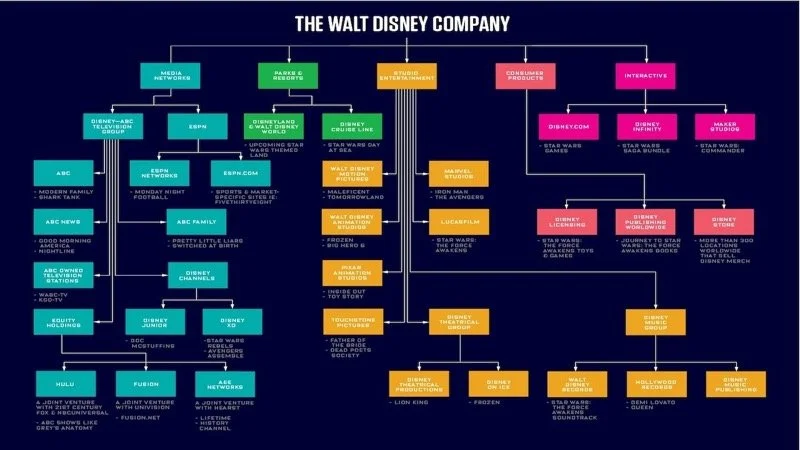Media Literacy 101: Lesson Three - Why
Image Source: LinkedIn
Hello Class.
I know it’s been a while since our last session on Media Literacy, but I’m here today to finish it up. We’ve talked about the “what” and the “who” of things we read and see, which are vital parts of the media literacy skill set. They’re doubly important to this final lesson in the series because when you look at the previous two, this one will make more sense. And then the coolest part of the process, the “aha” moment when everything sinks in, is when you practice the skills learned today, pieces start to fall together, and you start to see the bigger picture.
The skill we’re working on today is “why".
First, let’s start with a discussion on understanding something about the media. In the United States, most of the media we consume is owned by a handful of massive corporations. Our government is feckless when it comes to reining in companies from getting too big, so much so that corporations have significantly more influence over our legislative process than the people do. As a result, only a few companies control the onslaught of information that flows toward us.
RELATED:
Let’s remember, as well, that what we consume is information in all different formats. We also have to remember that these corporations, while they seem like behemoth machines, are still operated and directed by individuals. Individuals have agendas, and when they’re in those positions of power, there isn’t really anyone to check their agenda, except maybe shareholders. All together, though, those individuals and the collective shareholders want nothing more than to make more money. Profit over everything, baby!
A prime example is the situation between Israel, Palestine, and Lebanon. Ironically, through the reporting of other media outlets, we’ve learned that board rooms and the executive suites of major news organizations from CNN to the BBC are bringing the hammer down on the language used to present the conflict to us, the consumers. Words like “genocide” and the like are redirected if brought up by speakers or completely avoided by the anchors. The headlines of newspapers use the passive voice when talking about Palestinian or Lebanese victims to avoid any sort of implication of Israeli responsibility, but the complete opposite is true when the victims are Israeli.
Image Source: Wired
These decisions impact millions, and perhaps billions. Most people consume without question and go about their lives. And it’s not even restricted to just the national and global broadcasts. The disappearance of the local newspaper over the past couple of decades is a prime example, followed by the carving up of local news broadcasts by giant corporations. There’s a great video (linked below) that shows the chilling effect of this when Sinclair started buying up local news broadcasts.
Where, then, should we get our reporting from? The easy answer would be independent news agencies, but even then, be cautious. Independent news outlets rely on subscriptions and donations to stay afloat. Those donations don’t always come from great and honorable sources, and, much like shareholders, if they don’t like what is being published, they could pull their funding. It’s not common, but it’s an ever-present fear. Even with funding, though, it’s not always enough. Many journalists, either out of a job because of cuts or disillusioned with the corporate model, have turned to freelance work. They have flocked to sites like Substack, where you can directly subscribe to their pages and support their work. They lack the resources that come from an established institution, but if they’re reputable reporters (see my “who” article for a refresher), you’re getting the dirt direct from the reporter, sans executive suite filtering.
Now, with all that said, let’s get to it.
What does “why” mean in media literacy?
The TL:DR of it is basically motivation. Human beings are biased animals. We have preferences, we have agendas, and we want people to listen to us. The “why” revolves around the motivation for a piece of media being made, whether it be a video essay or an investigative piece from a journalist. You’ll do this a lot more when you’re just starting to put media literacy into practice because it takes a bit of time to think through things and evaluate motivations. But like the other two, the more you do it, the more it will just come naturally. You’ll find yourself scrolling your feeds and only paying attention to the journalists you know are legit and reputable, and you might even subscribe to their reporting or their YouTube page.
Pay attention to the platforms people use to broadcast their message. The Daily Wire is notoriously far right on the political spectrum, and none of those people are journalists. Anyone, and I repeat, anyone can put a video on YouTube. Just because someone has a massive following on streaming sites does not imply they are an authority on things. We live in a world obsessed with content, and much of it is particularly stupid and only there for brief entertainment. A lot of kids today, when asked what they want to be when they grow up, say they want to be a YouTuber or an influencer. Why is that? Because it gets at the crux of why “why” is one of the most important things to ask when evaluating a source online.
To be fair, not everyone does things for money. But also, to be fair, because of the system we live in, we have to have money to survive. Until we achieve our Star Trek utopia, we’re stuck with material possession-based realities. Kids want to be influencers and YouTubers because of monetization. If your content is popular enough, it gets monetized, and you start to earn money for the stuff you put out there. As I said above, we’re content obsessed, and much of it is stupid entertainment. Watch any Mr. Beast video. I’ll say this again: anyone can put something on YouTube.
Image Source: PolisPandit
Sadly, money is one of the strongest motivators, and a lot of the money backs up the negative, vitriolic, and false information that dominates our attention on the internet. It comes down to our basic psychology. It’s easier to be mean, and we like watching drama. It gets clicks, and clicks equal dollars. It’s why you don’t see fluff pieces on the local news all the time. It’s always crime. Keep the populace scared, and they’ll constantly tune in to make sure they know what’s going on. Ya know, for safety.
Much like politics, if you follow the money, you’ll understand why people do what they do and say what they say on the internet. Tim Pool’s latest controversy is a prime example. There has been a noticeable change in his rhetoric about the Ukraine war within the last few years, and then we learned this year that Tim Pool is a person of interest in a case by the FBI where media influencers were receiving large payments by Russia to promote Russia-positive news. Always. Follow. The. Money.
This is not all without hope. Like I said, there are good sources out there, and while they do feel pressure from above, many, like I said, are using the same tool the liars are using to fight back. Check out people like Taylor Lorenz and Ken Klippenstein. They both previously worked for larger institutions and then went out on their own, taking their following with them to continue to do great reporting but answerable only to themselves, taking all the fire, and keeping us informed. They’re real heroes.
READ NEXT:
Source(s): YouTube
















